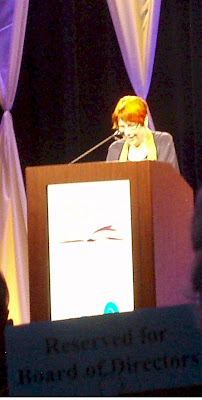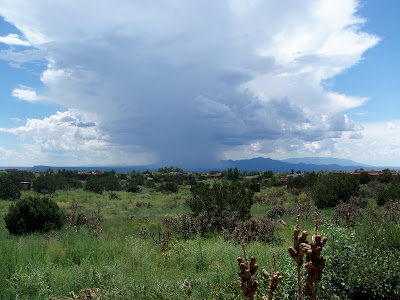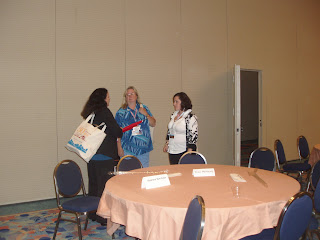 Thanks to Cynthia Eden for snapping this pic of my Gathering costume. Obviously, I went for whimsical steampunk rather than accurate, but it was a wild and wonderful party.
Thanks to Cynthia Eden for snapping this pic of my Gathering costume. Obviously, I went for whimsical steampunk rather than accurate, but it was a wild and wonderful party.
I’ll get to that.
Friday dawned with me hustling to hear Susan Elizabeth Phillips workshop on the Six Secrets of Being a Bestselling Writer. I’ve heard her speak before and she’s dynamic, inspirational and spot on. I tweeted a lot of her workshop, which turns out to be useful because it’s almost like I took notes.
She says that a bestseller is first and foremost compelling. The six magic words are: Keep the Reader in the Story.
1st tip to keep the reader in the story: Craft. Bad craft pulls the reader out of the story. Good craft won’t guarantee a compelling story, but bad craft is certain to ruin it.
2nd tip: Characterization. Write characters the reader can’t bear to be parted from. In popular fiction, characters should be larger than life. As opposed to literary fiction, where characters are frequently the average or smaller than life person.
3rd tip: Have a believable plot. Don’t manipulate your characters just to advance the plot. The plot should aid how the characters change. Characters should be capable of doing something at the end of the book that they couldn’t do at the beginning.
4th tip: Keep the pages turning. Create a fast-moving plot to keep the reader in the story. The secret? Cut out the boring parts! The boring parts are usually backstory, description and research you love.
That’s the nuts and bolts. She said a lot more, but that’s the gold. Sounds like simple advice, but the hard part is following it.

I popped in on the St. Martin’s Press spotlight. Editors Jennifer Enderlin, Monique Patterson, and Rose Hilliard spoke. They were a breath of fresh air. They talked about how much they love writers and books. They refused to talk about what’s hot or not because trends are irrelevant. They want good stories. Interestingly, they also said they don’t make acquisition decisions by committee. It’s up to the individual editor.
In a serendipitous turn of events, I ran into Cynthia Eden and her fabulous agent, Laura Bradford, on the way to lunch. We scored a table directly behind the one reserved for the RWA Board of Directors and so had a great view of Jayne Ann Krentz for her lecture. She also writes as Jane Castle and Amanda Quick. While we  ate, Laura told us an interesting story about how she’d tweeted “If you did decide to go w/ another agent, I would appreciate it if you would sell yr ms RIGHT AWAY, so I can have closure on my bitterness.” Followed by “Seeing news of your giant 7 figure deal helps me with my healing process.” A blogger tore her up about it, thinking she was insincere. It was a great insight into the agent’s world.
ate, Laura told us an interesting story about how she’d tweeted “If you did decide to go w/ another agent, I would appreciate it if you would sell yr ms RIGHT AWAY, so I can have closure on my bitterness.” Followed by “Seeing news of your giant 7 figure deal helps me with my healing process.” A blogger tore her up about it, thinking she was insincere. It was a great insight into the agent’s world.
Jayne talked about her multiple pen names and reinventing yourself as a writer. Not many know that she invented the Amanda Quick name because she’d had several poorly received books under Jayne Ann Krentz. She’d become unsellable by trying to do paranormal romance before its time. She didn’t give up at that point, but reinvented herself as a historical author. Great testament to persistence.
That afternoon, I pitched to an agent and an editor. For those who have never seen the Great Hall of Pitching at an RWA National Convention, this is what it looks like. The people in front are queued up to check in. The rows of tables behind them contain an agent or editor on one side and a hopeful writer on the other. The cavernous room is filled with hush and angst.
My agent pitch did not go well at all. She glazed over immediately. Actually I think we just didn’t click with each other. I would say she hated me on sight, but that would be overly dramatic. The editor loved the sound of The Body Gift and
at all. She glazed over immediately. Actually I think we just didn’t click with each other. I would say she hated me on sight, but that would be overly dramatic. The editor loved the sound of The Body Gift and  requested a partial and a synopsis (which I now have to write -erf). Technically the agent requested, too, which was courteous of her. However, one of the great benefits of face-to-face pitching is getting a feel for each other. Even if my manuscript excited this agent, I don’t think we’d enjoy working together.
requested a partial and a synopsis (which I now have to write -erf). Technically the agent requested, too, which was courteous of her. However, one of the great benefits of face-to-face pitching is getting a feel for each other. Even if my manuscript excited this agent, I don’t think we’d enjoy working together.
Alas.
But then it was party time! FFP’s Gathering came off in a splendid way. Thanks and love to everyone who helped and didn’t mind me racing around like a mindless ninny. There’s the wrap-up of the costume contest, with our three celebrity judges conferring behind, from left to right, Chris Keesler, editor at Dorchester Books, writer Cynthia Eden and Lindsey Faber, managing editor at Samhain Publishing.
We stayed up way too late after the party, having drinks and talking. I particularly enjoyed hanging with Laura Bickle and Linda Robertson. Terrific writers and very supportive gals. They didn’t even mind that I wept a little into my martini over the lackluster agent encounter.

Saturday I spent by the pool. I hadn’t really played much during the conference. People kept asking me if I’d seen the sights and I kept saying, um, no, but it’s a pretty hotel!
One really lovely thing, an editor friend sent me a note about the lackluster agent encounter offering me a list of agents she likes and permission to name-drop her, which made me feel all warm and fuzzy.
By the time Linda, Allison and Laura suggested that we bail on the Rita and Golden Heart awards ceremony and hit the Magic Kingdom ins tead, I was all for it. (And no, I did not get the khaki pants memo – but at least I’m not in the picture.) We had a great time wandering around, being kids and not industry professionals.
tead, I was all for it. (And no, I did not get the khaki pants memo – but at least I’m not in the picture.) We had a great time wandering around, being kids and not industry professionals.
And Space Mountain was just as fabulous a ride as I remembered.
























